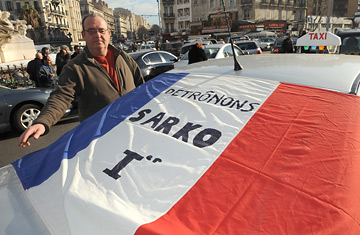
A taxi driver demonstrates with a national flag reading "Let us dethrone Sarkozy I"
Despite his carefully honed image of being always at the top of his game, French President Nicolas Sarkozy is taking a lot of solid shots on the chin these days. Disappointing policy results, hotly challenged reform proposals, and peaking public disgust with his overexposed private life have fueled a dizzying plunge in Sarkozy's approval ratings. That darkening image could have consequences. Just five weeks before the first round of nationwide municipal elections, rightist candidates fear a possible leftist rout in cities across France as voters signal their displeasure with Sarkozy's national leadership.
Proof that Sarkozy's honeymoon with the formerly adoring French public is over came on Thursday — just five days after his Elysée wedding to former top model Carla Bruni. All three of the nation's newsweeklies hit kiosks with critical Sarkozy-focused cover stories. The cover line on L'Express is "The Disappointment"; Le Point details "What's Going Wrong" and the Nouvel Observateur calls him "The President Who Went Pffffftt." And that wasn't the only suggestion Sarko's presidency is deflating. New polls confirm the precipitous drop in Sarkozy's approval rating, from his near-record high of 65% in July 2007 to 41% this month. That low matched the February 1996 score of former President Jacques Chirac, after a bitter three-week national strike derailed a proposed pension reform — and led to the left's return to power the following year. Pollsters ascribe Sarkozy's descent to the defection of older and traditional conservative voters resentful of his high-profile love life and unabashed materialism, and to still undelivered promises to rev up France's sputtering economy.
For days, the French dailies have carried quotes from candidates of Sarkozy's conservative Union for a Popular Majority (UMP) party who complain of negative feedback about the President from voters ahead of municipal polling in March. Others also complain about how advisers in Sarkozy's omnipotent Elysée now regularly make policy announcements normally reserved for government cabinet ministers.
On Wednesday, for example, Jean-Pierre Jouyet, the Secretary of State for European Affairs, told reporters that the Elysée "shouldn't substitute itself for the government." The growing chorus of criticism reaching into his own government became too much for Sarkozy, who used Wednesday's weekly cabinet meeting to "Bang His Fist On the Table", as the daily Le Figaro headlined it.
"I listen, I read, I hear everything that's said. After the municipal elections I will take, with sang-froid, the necessary decisions," Le Figaro and other media reported Sarkozy warning government ministers. That was clearly Sarkozy's warning that all carping was to stop, widely interpreted as an implicit threat to ministers who'd already crossed the line that they'd be removed once the municipal elections are over.
Were his problems limited to bad polls and petty rivalries for media face time, the picture for Sarkozy wouldn't be so bad. But as he met with his cabinet, thousands of taxi drivers protesting proposed deregulation of their profession created mammoth traffic jams in cities across France — another in a series of strikes Sarkozy's wider reform drive has faced since October. This time it was cabbies denouncing sweeping liberalization across a range of small, protected business sectors, as proposed in a study by an expert panel commissioned by Sarkozy to find ways of stimulating economic growth. The commission is headed by Jacques Attali — a former adviser to late Socialist President François Mitterrand who backs Sarkozy's effort to shake up France — and its report enraged small businesses like taxi drivers, pharmacists, hairstylists and convenience store operators with deregulation proposals that owners say will seriously undermine their livelihoods. Though Sarkozy immediately dismissed a few of the 316 proposals in the so-called Attali report, he said he'd integrate the remainder in future reform.
Conservative legislators and mayoral candidates, however, pointed out that business owners most affected by the Attali report are historically stalwart UMP voters, and likely to join the rising tide of displeasure at the municipal polls next month. That and other challenges appear to have caused Sarkozy to blink at long last. On Wednesday, leaders of protesting taxi drivers were called to the Elysée and assured the deregulation plans had been shelved. And despite Sarkozy's avowal in December that state "coffers are empty," the presidency also announced new handouts for retirees receiving minimal pensions — a demographic pollsters count among the largest defectors in Sarkozy's approval slide. Whether all that is enough to protect conservatives from a municipal mauling will be seen in March. If is isn't, however, the criticism now burning Sarkozy's ears could get even hotter.
